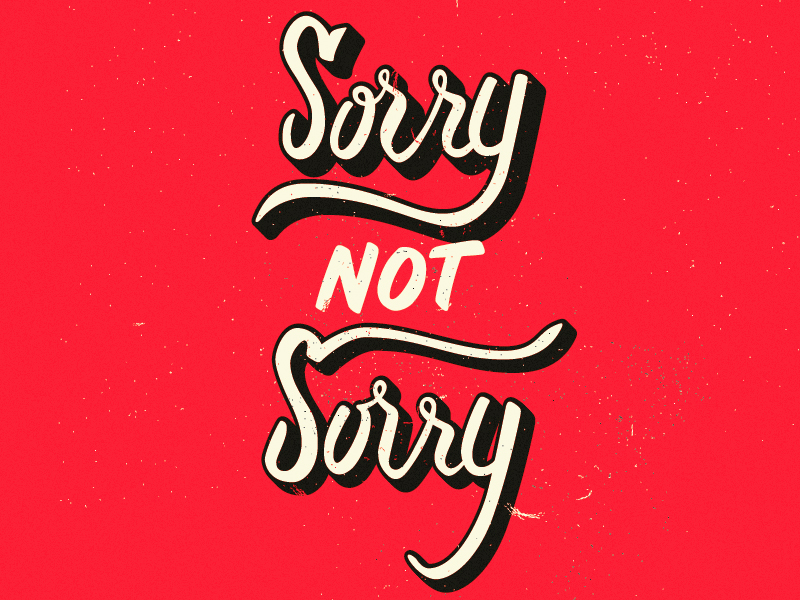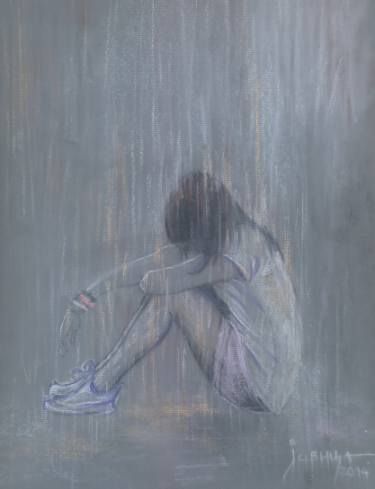
Sorry I’m Not Sorry for Saying I’m Sorry
“You apologize too much. Just stop.”
“Why are you apologizing? You didn’t do this.”
“No need to say ‘sorry’ when you haven’t done anything wrong.”
“Seriously! Stop! Saying! You’re! Sorry! It’s so frustrating!”
*Real life quotes from real life friends and loved ones.*
Saying “I’m sorry” doesn’t necessarily mean what people generally think it does, at least not here in the South. I submit that all of the “I’m sorry’s” get misunderstood much like the Southern head tilted “Bless Your Heart,” phrasing that gets tossed around here in the deep South.
IF you are unfamiliar with that famous Southern phrase, please allow me to explain. In Southern culture, we are known for being polite to a fault and being able to insult you with a smile that drips with sugar-filled niceties. If you are not familiar with the tone in which the phrase has been said, then you may very well take it as a sweet phrase and move forward in your life. If you are familiar with this phrase then you are most certainly looking for the tone and manner in which it is said. Like many other words in the English language, this phrase harbors not just one, but TWO different meanings.
Example 1:
Person 1: “I just found out that my mom has cancer and it’s devastated the whole family.”
Person 2: “Oh my goodness, bless your heart!” Usually said with utmost concern, a hand on shoulder or arm, pinched face and sincerely spoken.
Example 2:
Person 1: “Yeah, the wife really pissed me off. She said I spent too much money on hunting stuff, so I told her that I was leaving and wanted a divorce. Well, it got a little heated when I grabbed my shotgun off the mantle and the shotgun went off, mind you I didn’t remember it was loaded, but the gun went off, went through the wall and right into my Ford truck! I didn’t realize that until I was five miles down the road and ran out of gas.”
Person 2: “Well…bless your heart.” Usually said with overstated frown and head tilt; all the while thinking, “You are such a dumb ass.”
SO…as you can see, this phrase can be used quite duplicitously either to show empathy or sympathy or a nice way of saying that you did a dumb thing, that you need a blessing and by the way, how on earth did you make it this far in life thinking and acting like that.
I would suggest in Southern circles or raised to be one of these “polite to a fault” Southern woman or man that “I’m sorry” doesn’t always mean an apology.
Firstly, let me say that YES, in the world over “I’m sorry” IS meant to be an apology. That is the common and most viewed way of accepting those words from another person, or better yet, saying them yourself. BUT, in Southern society, when raised in an area where you feel not only your family’s hardships, but your friends’, neighbors’, community’s, country’s hardships “I’m sorry” is more likely an empathetic statement rather than an apology.
I can only speak as a Southern woman raised by a Southern family, in a small Southern town. Yes, we are taught to apologize profusely for some of the smallest inconsequential things, such as apologizing to inanimate objects you may run into, apologizing for being in someone’s way on the sidewalk or store, apologizing for not physically bumping into someone, apologizing to people in cars for being in the wrong lane or stopped at a light or stop sign, apologizing to animals if you happen to step on their toes or if you are driving down the road when they decide to cross…as Southern women YES we are taught, trained, ingrained with apologizing in the most honest, sweet fashion.
BUT, in all that rigorous training to be the best Southern Lady you can be, we are taught something special, most of the time by example. EMPATHY. I can’t count how many casseroles, gumbos, cakes, cookies, and pies were made for someone the family knew or barely knew that happened to be struggling at that time. I can’t count how many times my mom was late getting home because a friend or “friend of a friend” was having a particularly hard time and needed some compassion, prayer and companionship. I can’t quantify how many people my father helped throughout his life, how many jobs and temporary jobs he supplied the weary guy coming through town, or how many people and families he helped make ends meet for the trade of a few weeks of good honest work. I have no way of knowing how many times he woke in the middle of the night to go and get the drunk from the bar, and then wake him for work the morning. While my mother “collected” people in emotional and spiritual need, my father “collected” people who were often in dire straights and just needed a job so they could start picking themselves up from all the knocks hard life had dealt out. All in all, the example they taught me without a word was EMPATHY. Any one of those people could’ve been one of us, and that is what made it so important to help others.
In this regard, I am reminded of an Cajun word/term that embodies this empathetic idea to help those who are not only family, but also family through the community. I do not claim to be proficient in Cajun French spelling so I will spell it phonetically: KOOT-MAN.
For example, a family in our small town had hurricane damage to their home that left the roof in need of repairs. A team of families gathered on a Saturday about 7AM and began. The men gathered roofing supplies, tossed up ladders and started the work, while the women gathered in the kitchen to manage the children, cook, and visit. By the end of the day, the kids were tired out from play, the men had completed the work, and the women fed everyone until they ready to burst. It was an amazing show of love and support for the community to come together to help someone who needed it. No one expected any pay for their skills or time; it was just what you did for family, friends, and people in your community. I’ve been told this is similar to a “barn raising” that the Amish routinely do in their communities. Either way, it was something to cherish, admire, be proud of, and even grateful for the fact that I lived in a community that actually cared for one another, rather than somewhere they didn’t know their neighbors, much less spare any empathy or sympathy for them.
In the South, we were taught and trained to empathize and sympathize with those not only around us, but in a general sense. We collect donations and offerings for people across the world. We raise money for those who have lost everything due to circumstances beyond their control, such as house fires or flood damage, or even hunting/auto accidents. It is instilled in us that we are more than just one human, but rather one part of a larger puzzle, whether it stops at the blood line of family, or continues forward into the community, the state, the nation, or the world.
It is with this heartfelt empathy and sympathy I use the words “I’m sorry.” When someone speaks with me and shares that they’ve had a tough day, they haven’t been able to sleep, someone or even their own self is sick, ill, or not in a good place mentally, I share those words of empathy and sympathy by saying, “I’m sorry.” Because guess what? I TRULY AM. I have empathy for all those who interact with me and the fact they share their struggles, no matter how large or small. Sharing these struggles gives me a sense of what they are dealing with, small or large. Sharing these things with me grants me closeness to them, making them a part of my world, just as my sympathy and empathy for them makes me a part of theirs. It strengthens bonds with friends and family, but also creates bonds with those who do not know me well. It’s always good to feel as though someone understands, and if they lack understanding, to know that they are rooting for you. These connections allow space and time to disappear, which in turn grants all of us the chance to touch (emotionally) and connect (mentally) with someone who needs support. AND, in doing that, as humans, we feel more connected to this world around us, as well as the people in it.
This empathy or sympathy is NOT PITY. None of this is done in pity or to pity someone. It is done to share in their burden and hopefully offer comfort, support, and perspective. This is NOT A COMPETITION about whose life is worse! This is a moment for connection that allows any number of humans involved to realize that you are not alone in whatever struggle you are dealing with. It is a moment to realize that there are kind people on this earth, even in the midst of madness, politics, greed, crime and murder.
“I’m sorry” is spoken for both apologies from the heart and empathy/sympathy from one soul to another. YES, I care if you had a bad day. YES, I am sorry that your family member has cancer. YES, I care that you worked all day and didn’t get treated well by your boss or coworker. YES, I care that you are mired down in a pit of despair because something in life hasn’t gone how you hoped it would. THAT’S what MY “I’m sorry” means. I care. I’m listening. I’ll offer comfort and kind words. I’m with you and on your side with these struggles, EVEN when I am not physically there to hold your hand or hug you so tightly that you can’t breathe. “I’m sorry” that you are hurting, but I’m here for you and whatever you need.
So, NO, I won’t stop saying it. NO, I won’t stop meaning it. I was raised to have empathy/sympathy not only for my friends and family, but also for those I meet along this journey of life. I won’t change my heart or apologize for my desire to support anyone having struggles OR cheer for them when they succeed. To stop this behavior would mean denying a large part of my heart, and I won’t do that…I’m sorry.



You must be logged in to post a comment.